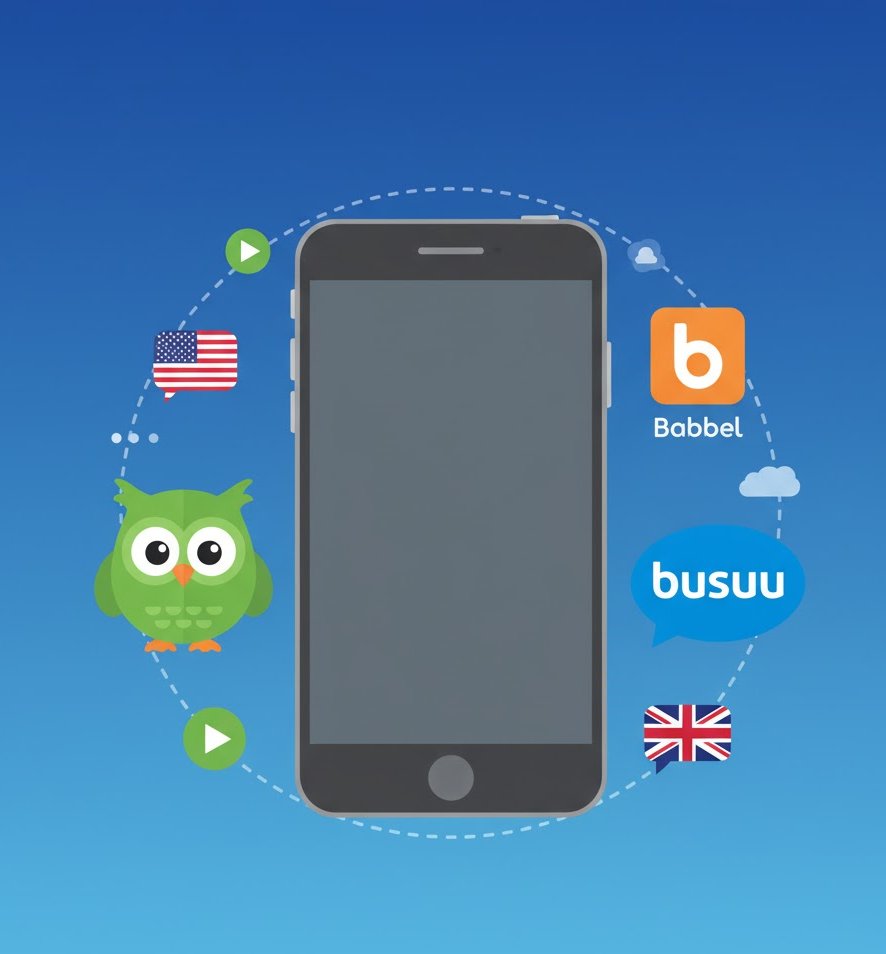Learning English is no longer a luxury but has become one necessity in today's globalized world. Consequently, the search for flexible and accessible learning methods grew up exponentially. In this scenario, Duolingo has established itself as the favorite app of millions of Brazilians, thanks to its user-friendly interface and gamification method. However, many students reach a point where they wonder if just the little green owl is enough to achieve fluency. Thus, the central question arises, which we will explore in this guide: What is the best app to learn English besides Duolingo??
The truth is that the world of language apps is vast and full of incredible options, each with its own strengths and methodologies. While Duolingo is an excellent starting point for building a study habit and learning basic vocabulary, other platforms offer greater grammar depth, a focus on realistic conversation, and AI-powered pronunciation training. Therefore, this article will serve as your definitive roadmap, analyzing Duolingo's strengths and weaknesses and presenting the best alternatives so you can choose the ideal tool to supercharge your journey to English fluency, all in the palm of your hand.
Duolingo: The Starting Point for Many Brazilians
Before we explore the alternatives, it's crucial to understand why Duolingo has become a global phenomenon. After all, its popularity is no accident; the app masterfully addresses certain aspects of initial language learning. Understanding its advantages and limitations is the first step to making an informed decision about your next steps in your studies.
Strengths: Why is Duolingo so Popular?
Duolingo's success can be attributed to three main pillars. First, its gamification It's brilliant. The points system (XP), offensives (consecutive days of study), and competitive leagues turn learning into an addictive game. This is extremely effective for maintaining motivation, especially for beginners who need constant encouragement to create a daily habit. This way, studying stops being an obligation and becomes a fun challenge.
Secondly, the accessibility is a major differentiator. Duolingo's free version is surprisingly robust, allowing anyone with a cell phone to start learning at no cost. Furthermore, its interface is clean, colorful, and intuitive, which drastically lowers the barrier to entry for people unfamiliar with technology or online learning platforms. Consequently, it has democratized access to language learning on an unprecedented scale.
Limitations: Where Does Duolingo Fall Short?
Despite its merits, Duolingo has significant limitations, especially for intermediate and advanced learners. One of the most common criticisms is that lack of depth in grammatical explanationsThe app uses a rote learning method, which can leave gaps in understanding more complex rules. Often, you learn the correct sentence, but don't fully understand why it's structured that way.
Another weak point is the limited focus on practical conversation. The sentences are often repetitive or even bizarre ("The bear drinks beer"), which doesn't prepare the student for real-world dialogue. Speaking practice, while available, is basic and doesn't offer the detailed feedback that other specialized platforms provide. Therefore, for those seeking fluency in oral communication, Duolingo alone may not be enough.
Duolingo: English and more!
Android
What's the best app for learning English besides Duolingo?
This is the question many students ask themselves after hitting a plateau in their learning. The answer, however, isn't unique. The "best" app depends entirely on your goals, your learning style, and the skills you want to prioritize. There's no magic solution, but rather the right tool for the right needs.
For example, if your main goal is to gain confidence in speaking and understanding everyday conversations, a conversation-focused app will be superior. If your biggest struggle is pronunciation, a tool with artificial intelligence for speech analysis will be the ideal choice. If you need a solid grammar foundation, platforms with more structured lessons and clear explanations will be more effective. The key is to conduct an honest self-diagnosis of your needs before choosing the next step.
Detailed Analysis: Duolingo's Main Competitors
To help you answer the question about What is the best app to learn English besides Duolingo?, we've analyzed four of the most popular and effective alternatives on the market. Each excels in a specific area, making them perfect complements or replacements for Duolingo.
Babbel: For Those Seeking Conversational Focus
Babbel positions itself as "the shortest route to real conversation." Its methodology is entirely built around practical conversations and everyday situations, such as introducing yourself, ordering food in a restaurant, or finding your way around a city. The lessons are short, lasting about 15 minutes, and designed to build vocabulary and grammatical structures that you'll use immediately.
Additionally, Babbel offers clear and concise grammar explanations in Portuguese, which helps solidify your knowledge. Its intelligent review system also ensures you retain what you've learned long-term. However, it's important to note that Babbel is a premium service, with most of its content available only to subscribers.
Busuu: Structured Learning with a Human Touch
Busuu offers a more comprehensive and structured curriculum, aligned with the Common European Framework of Reference for Languages (CEFR). It combines vocabulary and grammar lessons with an incredible advantage: a global community of native speakers. At the end of certain lessons, you can submit writing or speaking exercises and receive feedback from native English speakers.
This human interaction is a game-changer, offering corrections and tips that an algorithm can't always provide. Busuu also allows you to create a personalized study plan, helping you stay focused and organized. Like Babbel, its most powerful features are available in the paid (Premium) version, but the investment is usually worth it for those who take their studies seriously.
Memrise: Boost Your Vocabulary the Fun Way
If your main challenge is memorizing new words, Memrise is the perfect tool. It uses spaced repetition techniques and mnemonics to help you effectively retain vocabulary. Memrise's biggest selling point is its thousands of short videos of native speakers pronouncing words and phrases. This helps connect the written word with the real sound and accent, making learning much more authentic.
The app is extremely useful for expanding vocabulary quickly and in a fun way. However, it's not a complete English course, as its focus on structured grammar lessons is less than that of Busuu or Babbel. Therefore, it works best as a powerful complement.
ELSA Speak: The Pronunciation Trainer in Your Pocket
Many Brazilians have studied English for years but still feel insecure about speaking due to their pronunciation. ELSA Speak was created specifically to solve this problem. Using cutting-edge artificial intelligence, the app listens to you speak and provides instant and accurate feedback on your pronunciation, intonation, and fluency, indicating exactly which sounds you need to improve.
It works like a true personal trainer, with a comprehensive curriculum covering all the phonemes of English. For those who want to reduce their accent and speak more clearly and confidently, there's no better tool on the market. However, it's a niche tool; it doesn't teach grammar or vocabulary from scratch, focusing exclusively on speaking.
How to Build Your Study Routine by Combining Apps
The most powerful approach isn't to choose a single app, but rather to create a learning ecosystem that combines the strengths of each. An effective study routine could, for example, be structured as follows:
- Daily Warm-up (10 min): Start your day with a quick lesson or two on Duolingo to fire up your brain and keep your offense going.
- Main Lesson (20 min): Spend focused time with a Babbel or Busuu lesson to learn new grammatical structures and vocabulary contextualized in conversations.
- Vocabulary Expansion (10 min): During a break, use Memrise to review old words and learn new ones with native speaker videos.
- Pronunciation Practice (15 min): Before bed, practice a few phrases in ELSA Speak to refine your pronunciation and gain speaking confidence.
This way, in less than an hour a day, you'll cover all the essential language skills: vocabulary, grammar, listening, and speaking. The key is consistency and a smart combination of available tools.

Conclusion: Finding the Right App for You
At the end of this analysis, it is clear that the answer to the question “What is the best app to learn English besides Duolingo??” is multifaceted. Duolingo remains a fantastic gateway to the world of languages, but to reach higher levels of proficiency, it's essential to look beyond and explore more specialized tools.
Babbel will immerse you in realistic conversations, Busuu will organize your studies with human feedback, Memrise will make your vocabulary explode, and ELSA Speak will refine your pronunciation to perfection. The final decision is yours. We recommend that you download the trial versions of the apps mentioned, try out their methodologies, and see which one best suits your pace and goals. By combining the right tools, your phone becomes the most powerful classroom you've ever had.



